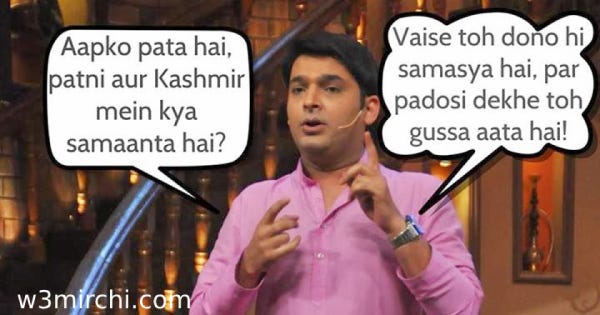Hello ji,
पत्नी (पति से)- मुझे ऐसा लग रहा है कि जैसे चोर हमारे किचन में घुस गया है और जो केक मैने बनाया था, उसे खा रहा है।
पति - तो मुझे किसे बुलाना चाहिए? पुलिस को या ऐम्बुलेंस को?
(Wife tells husband that she thinks there is a thief in the kitchen, eating the cake she baked. Husband asks whether he should call the police or an ambulance.)
पत्नी (पति से)- मेरी तरफ मुंह करके सो जाओ ना, मुझे डर लग रहा है।
पति (पत्नी से)- अच्छा, और मैं भले ही डर के मारे मर जाऊं?
(Wife tells husband to please sleep facing her because she is feeling scared. Husband asks what about the fact that he might die of fear himself if he looks at her face.)
पत्नी (पति से)- देखो जी, हमारी शांताबाई का पति, उसको खुश रखने के लिए, हर हफ्ते फिल्म दिखाने ले जाता है, आप क्यों नही ले जाते?
पति (पत्नी से)- अरे, मैंने भी शांताबाई को फिल्म के लिए बुलाया, लेकिन उसने मना कर दिया, इसमें मेरी क्या गलती है?
(Wife tells husband that Shantabai's husband takes her for movie nights, and asks why he doesn't plan one too. Husband says he can't help that she refused when he tried to take Shantabai for a movie.)
Maybe you can tell - I have been looking forward to writing this one for a while now.
Don't you just love WhatsApp groups?
The great Maya Angelou once said, "When people show you who they are, believe them."
And I honestly feel that nothing offers more of a sneak-peek into who people really are than the jokes they forward.
Humour has a much broader zone of acceptance than reality.
In reality, many subjects are serious and deserve to be taken seriously. But the rules bend for humour. In fact, making fun of the most serious issues sometimes makes for the best humour.
And so, people who would never express their racism, casteism, classism, or misogyny on an open forum will still happily forward a 'joke' that is based on the same premise. We are all supposed to laugh it off and let it go because 'it is just a joke'.
This is never clearer than when it is a woman who is the butt of the joke.
People who would never openly say "women are weak or lazy or greedy or deserve to be live under a man's heel" will still forward a joke that is based on the same premise - you just read a choice selection of some pearls from this ocean.
And forwarding such jokes is how people show you what they truly think of women.
I love WhatsApp groups because it is not until you see that Aamir Khan divorce joke on the family group that you realise, "Oh, Foofa ji is an islamophobe". And it is not until he sends a Sunny Leone joke that you realize that the colleague who sits two cubicles away from you is a creep.
Extrapolating the same thought, nothing will show you who the men of India truly are more than a glimpse at an all-male WhatsApp group. It is the Indian equivalent of what America calls a Boys Locker Room - and just as full of repulsive conversation, forwards and “jokes”.
‘Bois’ locker room
Last year some very disturbing screenshots from a 'Bois Locker Room' chat came out on Instagram, where boys and men were sharing photos of underage girls, rating them, and exchanging lewd comments and vile messages, objectifying the girls in the photos. The matter is still under investigation - especially for some rape threats made on the group. Every party - the girls, the boys, the families, the schools - has different versions of the events.
Puneet recalls the discussions on his all-boys group following the screenshots coming out.
"I am from a small city. But in every town of India - big or small - there are boys locker room discussions going on in every classroom. And there are WhatsApp groups for these as well. Every guy I know - including myself - is a part of such WhatsApp groups. That is just a fact."
Puneet went on from school to study at Delhi University where, he says, he had the experience of working with some great women and that experience taught him a lot.
"We still have a boys group and we talk about women in that group. When the Bois Locker Room screenshots came out, a friend of mine texted the group saying, 'This (not the rape threats, but definitely the objectification of women) is something that happens and we should acknowledge that sometimes we say these kinds of things as well'. All of us had to admit that he was right. Until then, in my head, these were normal conversations that boys have. But after those chats came out, I realized that what we were doing was wrong. It was very wrong."
Peer pressure to laugh along
Payal shares how young girls feel social pressure to go along with such offensive jokes and comments in order to fit in with their peer groups.
"As a girl, if you call this out, you are called 'touchy' and 'sensitive'. You become tagged as 'not a sport'. You are expected to not just go along with such jokes, but crack them yourself, just so you can fit in and be considered 'cool' by the boys. I have seen a lot of girls giving in to this pressure, and over time, they internalize these stereotypes themselves and start believing them to be true. So the peer pressure is something which is really troubling, especially among the young and impressionable."
Payal herself grew up playing soccer, hanging out with the boys and says that she internalized these stereotypes herself at some level.
"I remember gossiping about other girls, and saying things like 'Girls are so boring'. Eventually, I grew out of it but I still see it happening among my peers, well into adulthood. And when I call out sexist jokes and casual comments against women, I am told that I need to lighten up."
Inside the Death Eaters’ lair
Chitra is a trans woman who went to a boys’ school as a child and an IIT for her undergraduate studies.
"This was before my transition when male friends - who, of course, assumed I was like any other guy - would say things that I still cannot bring myself to repeat because of how toxic and sexist they were. I can also never forget them. For example, disgusting comments about the bodies of girls in our class. Rhymes scrawled across the wall - not just in boys' toilets - but even in common areas, which named specific girls, and made obnoxious remarks about parts of their bodies. I used to wonder how I am supposed to blend in with these boys and men."
Chitra - who is, ironically, a Harry Potter fan - told me these jokes made her feel like Snape.
"Like Snape, I felt like I spent years with the Death Eaters, acting like I was one of them, knowing all these secrets, but was never one of them."
Chitra got back in touch with the 'Death Eaters' many years later when she joined her school batchmates' WhatsApp group after her transition.
"When I came out to the group, some were supportive, some were confused, many were silent. A few were creepy in direct messages to me but not on the group. But largely, the group seemed to accept it. And then, they just carried on with their usual sexist jokes about women, with the assumption that 'because I am lesbian, I would also laugh along at those jokes'. Most of the conversations were still the same that they were 20 years ago. These are men who are now married with kids - and somehow they are still talking in that crass manner."
"I also want to add that the ones who talk and behave in the most toxic ways might be very few, but a much larger number are simply silent bystanders if not actively encouraging or complicit in the toxicity. Most of us just find it easier to ignore and let these things slide rather than directly confronting them."
Women who call it out
But direct confrontation is never simple either, is it?
Munira used to be a part of a school WhatsApp group where sexist jokes were par for the course.
"I remember this one joke about how Aryabhatta discovered the zero when he was asked what are the chances his wife would let him go out for a drink with his friends. I called out the person who sent that joke, and was told, 'It is just a joke'. But the more I thought and read up about it, the more I realized that such jokes do serious damage by reinforcing some really harmful stereotypes against women."
Munira realized that it was unlikely that men would be able to relate to how these jokes feel to a woman unless they were hurt in the same way. So, she tried a rather bold experiment.
"I studied at a lower middle class school, which had a healthy mix of Muslims, Hindus and Christians - almost one-third each. To get my point across, I started forwarding Muslim jokes to the group. I didn't want to talk about other religions, but I am a Muslim, so I think I can make fun of my own religion."
Munira says she saw instant reactions to her jokes.
"That made people very uncomfortable and they stopped laughing. Men on the group started telling me that jokes can offend, jokes can hurt. They really started proving my point for me. This solution is not something that I'm particularly proud of, but I tried it when I was frustrated, and it worked."
Munira is a big believer in calling out such jokes on any group she is a member of.
"I really fight on groups - especially family groups, school groups, college groups - against people who forward such jokes. I know that I'm not going to change their mindset. But all I want is that people should be careful about the kind of jokes they make in public. So if I'm in a group, I won't allow any of these jokes. And then, maybe, some teenaged girl or boy somewhere will not have to hear this joke in the long run."
Men who call it out
It is not like men who call out this behaviour have it far easier, either.
Kruti graduated as the only female engineer of her class of mechanical engineering and joined a manufacturing plant.
"I chose a male-dominated field and so, for several years, I was the only woman on the shop floor. I had to teach myself to tolerate the way men talk, using cuss words as punctuation marks. Most of these cuss words are derogatory to women."
A few years into her job at the firm, a sexual harassment case came forward when a woman released a recorded call of her senior harassing her.
"The recording went viral in the organization. One day, I was talking to a male colleague and friend who worked in the night shift. He told me how the men on the shop floor would listen to the recording of the woman being harassed repeatedly, and discuss the clothes she wore, the way she talked to men - insinuating that she was of a 'loose' moral character and somehow deserved to be sexually harassed."
The man who sexually harassed the woman was simply transferred to another department. But things became so toxic for the woman that she had to eventually quit the organization.
"The 'jokes' went on long after she left the organization. My friend told me they were too disgusting for him to tolerate. One day, he just could not take it anymore, and called them out. Immediately, the men shifted their focus and began targeting him for being 'too soft'. They even started making homophobic slurs, questioning his sexuality to indicate that he 'was not man enough' to crack such jokes."
Eventually, the work environment became too hostile for Kruti's friend - this lone man who stood up to defend a woman - and he was forced to quit his job as well.
Now this Womaning vaali will decide what we joke about also?
Ever since I took to calling such jokes out, I have had people accuse me of not having a sense of humour.
This really hurts my feelings. Because, the truth is, I am a massive stand-up comedy nerd.
I have spent (wasted) a significant chunk of my life watching stand-up comedy from India and across the world. I have read every piece that I could lay my hands on where a great comedian shares their writing process. I have dabbled a bit in it myself (I think one or two embarrassing videos are out there in the dark corners of the web, even.)
People defend these jokes in the name of "edgy humour" and throw around statements like "anything can be funny".
And they are right. A good joke can be written about anything - caste, race, class, gender, covid, cancer, death. (There, I took it farther than even pioneers like Kapil Sharma dare venture.)
What matters is not the subject of the joke, but the punchline of the joke.
Specifically, who is the punch of the punchline?
Is it a joke that's punching down, i.e. making fun of the segment who is powerless in real life - the suffering, the downtrodden, the oppressed?
Or is it a joke that is punching up - making fun of the segment that is powerful in reality - the cause of the suffering, the privileged, the oppressor?
For example, if it is a cancer joke, is it making fun of cancer the disease (causing suffering), or the cancer patient (the sufferer)? If it is a caste joke, does it make fun of people from forward (privileged) or backward castes (underprivileged)? If it is a class joke, is the punchline the rich guy (oppressor) or the poor guy (oppressed)?
‘Edgy humour’ enthusiasts: Do you think it is possible to joke about the Holocaust?
Absolutely. As long as the oppressor - Hitler - is the butt of the joke. A great example shared in this piece is:
Hitler to a fortune teller: “Tell me when I will die.”
Fortune teller: “You will die on a Jewish holiday.”
Hitler: “But which Jewish holiday will I die on?”
Fortune teller: “Any day you die will be a Jewish holiday.”
Similarly, can there be funny husband-wife jokes?
Absolutely. Enjoy some of my personal favourites:
Hope you laughed as hard at this as at them WhatsApp forwards. If not more.
Mahima
If you like the work I am doing with this newsletter, show me your love by buying me a coffee. Click ‘Membership’ or ‘Support’ on:
Womaning in India is on Instagram, Facebook, Twitter, and Clubhouse.








I have obviously been a part of such groups in the past. Left in disgust and could totally relate to a lot mentioned here. I really don’t know when will this change but I sure know this post is going to a lot of uncles I know who refuse to acknowledge they are uncles and still a part of misogynistic groups sharing girls getting slapped videos et al.
I am a part of just one whatsapp group. It is the best whatsapp group so all this doesn’t happen there. I wish more groups like that whatsapp group. Groups mein Groups, Parag Group.
Good one Mahima.
Now when I think of the 'jokes' I used to find funny, not only as an adolescent but even as a youngish adult eons ago, make me cringe and dislike myself. I console myself by thinking - well you dislike the then you, something must have turned out right. But that is not enough, calling out 'locker room' rubbish is important, and I have tried to do that. The only problem for me is that I am now not part of ANY whatsapp group of ONLY male friends from university or school. Come to think of it, it is not a problem at all :)